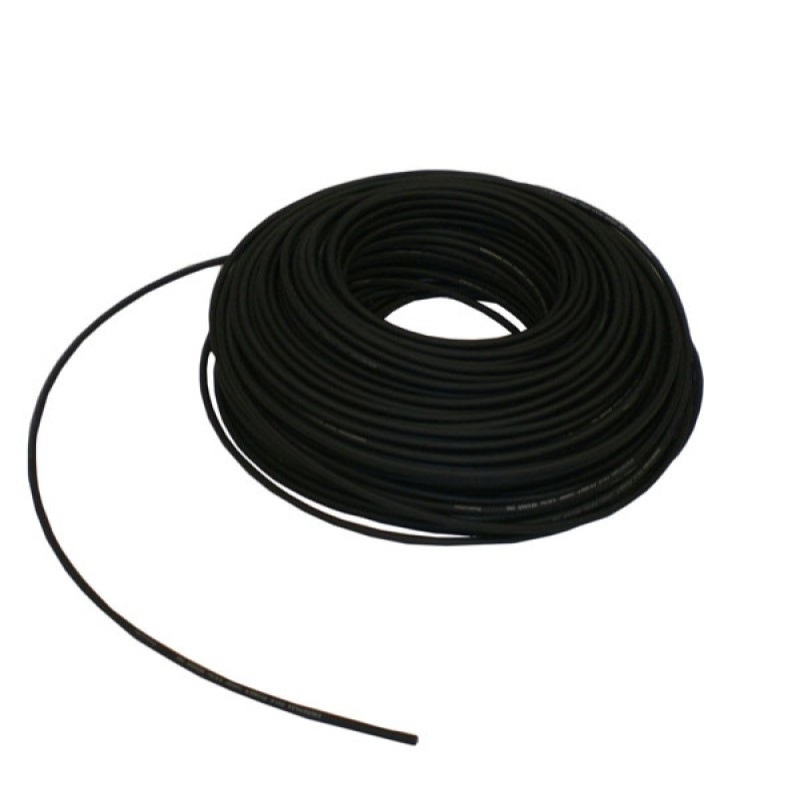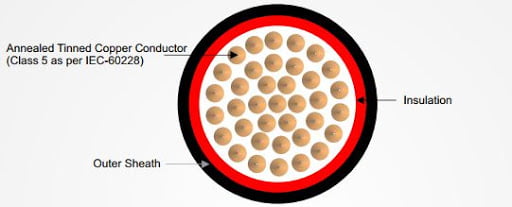Solar PV Cable Negative (-) Black
R16.10 – R33.35 incl Vat
Solar PV Cable Negative (-) Black
Solar wires, used to connect the components of a photovoltaic system, come in various types. Typically, it connects four components: the solar panel, the inverter, the charge controller and the batteries.
Choosing an appropriate type of wire in a PV system is crucial to its operation and efficiency. Using a wrong solar wire might not deliver the appropriate voltage and fail to power up the electrical units or result in the battery bank’s failure to charge fully.
Description
Solar PV Cable Negative (-) Black
Technical Data
| General Data |
4mm (+) Positive (Black) |
Solar Cable: 6mm (+) Positive (Black) |
Solar Cable: 10mm (+) Positive (Black) |
|---|---|---|---|
| Cable Cross Section | 4mm² | 6mm² | 10mm² |
| Cable Color | BLACK | BLACK | BLACK |
| Nominal Voltage | Uo/U=600VAC/1000VAC, 1000VDC/1800VDC | Uo/U=600VAC/1000VAC, 1000VDC/1800VDC | Uo/U=600VAC/1000VAC, 1000VDC/1800VDC |
| Test Voltage | 6500V, 50Hz @5Min | 6500V, 50Hz @5Min | 6500V, 50Hz @5Min |
| Conductor Material | Tinned Fine Re-Copper Strands | Tinned Fine Re-Copper Strands | Tinned Fine Re-Copper Strands |
| Core Insulation | Special Cross-Linked Compound | Special Cross-Linked Compound | Special Cross-Linked Compound |
| Sheath Insulation | Special Cross-Linked Compound | Special Cross-Linked Compound | Special Cross-Linked Compound |
| Safety Rating | IEC60228 / VDE0295 | IEC60228 / VDE0295 | IEC60228 / VDE0295 |
| Environment Limit | |||
| Insulation | Suitable for Outdoor / Harsh Environments | Suitable for Outdoor / Harsh Environments | Suitable for Outdoor / Harsh Environments |
| Resistance | UV, Ozone & Hydrolysis | UV, Ozone & Hydrolysis | UV, Ozone & Hydrolysis |
| Elevated Temperature Resistance | Excellent Chemical and Corrosion Resistance | Excellent Chemical and Corrosion Resistance | Excellent Chemical and Corrosion Resistance |
Wire Composition
- In general, there are two types of solar panel wires either single or stranded wire. As the name suggests, single or solid wire contains single metal wire core while stranded wire consists of multiple stranded conductors.
- A protective sheath insulates the single wire, but there are also bare wires. Solid wire type is recommended for static application, particularly for domestic electrical wiring.
- For the same carrying capacity, solid wires are more compact in diameter compared to stranded wires. Single wire costs less, but is available only in small gauges.
- As mentioned above, the stranded wire consists of several conductors twisted together and covered with jacket to form a multi-strand wire.
- Stranded solar wire is more flexible and has the ability to sustain frequent movement.
- The recommendation is to use standard wire if you install your solar system in a location with high winds or subjected to frequent vibration.
- Since there are several conductors in a single run, stranded wire offers better conductivity. Compared to solid wire, stranded wire has larger diameter and is more costly.
- Standard wire is the typical choice for larger and outdoor installations.
Wire Material
- Solar wires can also be classified based on the conductor material used. For domestic and commercial installations, the use of aluminum and copper solar wires is common.
- Copper wire has superior conductivity compared to aluminum. The same copper solar wire size carries more current than aluminum. Copper offers flexibility and better heat resistance.
- It supports both indoor and outdoor applications. However, copper wires are more expensive. Solar panel cables Meanwhile, cheaper aluminum wires are more rigid and weaken when bent.
- They come in larger gauges and typically used for outdoor installations, such as for service entrances.
Solar cable is a composite of several insulated wires enveloped by an outer jacket. Professionals use them to interconnect solar panels and other components of a photovoltaic system. They handle high UV radiation, high temperatures, and are weather resistant. Usually, they are installed outside or within the solar panels.
A cable varies in diameter depending on the number of conductors it contains. Classification of Solar cables is based on the number of wires and their gauge. In general, there are three types of cables used in a PV system: DC solar cables, solar DC main cables, and solar AC connection cables.



